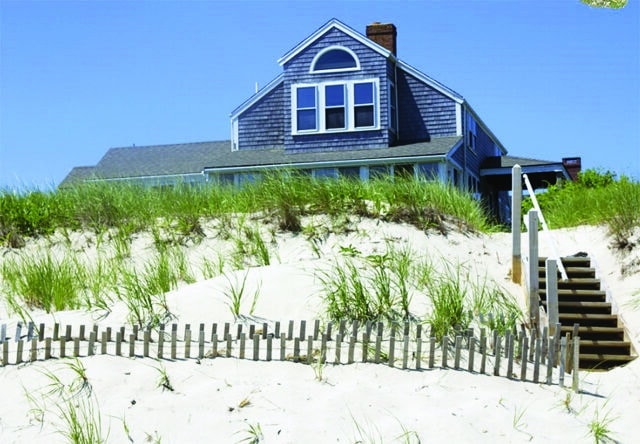
This three-bedroom cottage in Nantucket town has been used for short-term rentals for 19 years. The property is advertising weekly rates of $6,300 to $6,850 for summer 2025. Photo courtesy of WeNeedaVacation.com
Nantucket’s thriving short-term rental industry offers benefits in a major source of local tax revenues and income for homeowners, but has attracted blowback in recent years for absentee investors’ role in the residential real estate market.
Four years into the debate, consensus remains elusive about whether to regulate the industry and what form new restrictions should take. At a special town meeting, voters last week failed to approve four separate proposals regulating short-term rentals.
Residents and officials alike expressed frustration that the topic has dominated municipal issues in recent years.
“It’s done more damage to the community of Nantucket than anything I’ve seen in this business,” said Greg Mckechnie, principal broker at Nantucket-based Great Point Properties, in an interview ahead of the meeting.
The simmering four-year-old debate has fueled arguments about gentrification, property rights and commercialization of residential areas on the sought-after island getaway.
Town officials including the Select Board and Planning Board submitted a zoning article designed as a compromise. But it met the same fate as those at four previous town meetings since 2021, failing to gain the necessary two-thirds majority.
“It’s designed to slow the possible growth of rentals as well as drastically reducing the profit margin on investor-owned [short-term rentals],” Nantucket Planning Board Chair David Iverson said of the zoning article, which was rejected by a 472-416 margin.
The board attempted to mollify residents who objected to disrupting the widespread practice of renting out homes for a portion of the year, providing a secondary source of income.

This four-bedroom cottage overlooking Nantucket’s Quidnet Beach is listed by online service WeNeedaVacation for weekly rentals starting at $14,000. A state Land Court judge issued a ruling that’s thrown the future of properties like this in doubt. Photo courtesy of WeNeedaVacation
The proposal would have put off any new restrictions at properties previously used for short-term rentals for eight years. Then new rules would kick in setting a maximum eight changes of occupancy during July and August.
Properties that changed hands after the zoning change would have faced stricter rules, reflecting the attempt to discourage investor acquisitions: a maximum of three changes of occupancy in July and August for the first five years.
“That to me is quite restrictive,” said Jim Reese, COO of online listing service WeNeedaVacation.com, in an interview. “Homeowners traditionally rely on weekly turnovers, so it [might have been] a barrier for some of them to enter the market.”
Skepticism About Enforcement of New Rules
Backers of tighter controls received more support, but not enough to attain a two-thirds majority. The nonprofit group Put Nantucket Neighborhoods First proposed its own zoning amendments classifying short-term rentals as an accessory use, requiring owners to occupy the dwelling for more days per year than renters.
Supporters said the bylaw, modeled upon one approved this spring in West Tisbury, would protect trophy homes in residential neighborhoods from being acquired by investors for resort-style accommodations. But opponents predicted the residency requirement would be impossible to enforce.
“How are you going to track who’s in the house? Are we going to have ankle bracelets?” former Select Board member Robert DeCosta asked.
The proposal failed to achieve the required two-thirds majority, in a 478-394 positive vote.
Charity Benz, a spokesperson for Put Nantucket Neighborhoods First, said the group will return with another proposal at the spring 2025 annual town meeting.
An occupancy tax on short-term rentals generates approximately $7 million per year in 2021 and 2022, according to a UMass-Donahue Institute study, comprising over 6 percent of the municipal budget. The town’s short-term rental registry includes nearly 11,000 properties.

Steve Adams
Land Court Ruling Clouds Legality
But the current legality of short-term rentals on Nantucket also is clouded by a March ruling in Massachusetts Land Court.
After a resident filed suit against the Zoning Board of Appeals and her neighbors at 9 West Dover St. who allegedly rented the property out for noisy parties, Associate Justice Michael Vhay ruled that short-term rentals are not allowed as a dwelling’s principal use in the town’s residential zoning districts.
Despite the ruling, town officials, acting upon the advice of Town Counsel John Giorgio, said they would not intervene in short-term rentals during summer 2024.
A message left with the Nantucket Select Board seeking clarity on the future legal status and enforcement of short-term rentals in the wake of Tuesday’s vote was not immediately returned.
After a big uptick immediately following the pandemic, the Nantucket vacation rental market has retreated to occupancy and rates similar to those in 2018 and 2019, said Reese, of WeNeedaVacation.com.
“There has been a lessening of demand and that is in comparison with the pandemic years which were unprecedented and unsustainable,” he said. “It’s a new normal.”
Real estate agents say the publicity about the latest proposed regulations has prompted questions from prospective renters about whether contracts will be honored for 2025.
“We are hearing from some people that Nantucket doesn’t want [vacation rentals] or that we can’t write leases, which is erroneous on both fronts,” Great Island Properties’ Mckechnie said.






